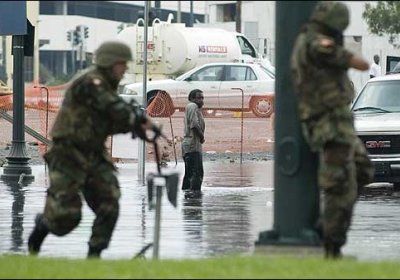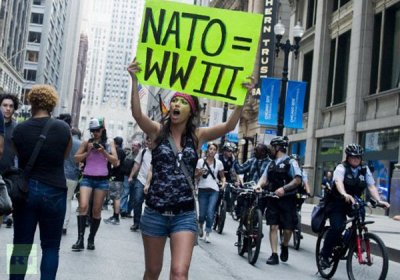It’s all over the news: images of police in military gear pointing war zone weapons at unarmed Black people with their hands in the air. These scenes made my heart race in an all-too-familiar way.
I was devastated for Mike Brown ― the unarmed Black teenager shot dead by police on August 9 ― his family and the people of Ferguson. Almost immediately, I closed my eyes and remembered the same fear for my own family that pangs many times over a given year.
1023
The Scottish Socialist Party is pushing a “yes” vote in Scotland’s September 18 referendum on independence.
SSP national spokesperson Colin Fox is part of the Advisory Board of Yes Scotland, the cross-party campaign for Scottish independence. He wrote a pamphlet with a vision for what an independent Scotland could look like, called “For a Modern, Democratic Republic”.
The appointment of dictator Prayuth Chan-ocha as prime minister by his hand-picked military parliament was such an unsurprising non-event that Prayuth did not even bother to attend. The so-called “vote” was unanimous.
Prayuth has set himself up as Thailand’s “Supremo”, placing himself in charge of all important posts. This harks back to the dark old days of the military dictatorships in the 1960s and 1970s.
As acclaimed writer Wat Wanyangkoon said: “The junta is detritus left over from the Cold War.”
In Place of Fear II: A Socialist Programme for an Independent Scotland
By Jim Sillars
Vagabond Voices Publishing, 2014
www.inplaceoffear.com
Jim Sillars is a well-known and well-respected figure on the Scottish political scene.
Elected a Labour Party MP for South Ayrshire in 1970, he shifted away from mainstream Labour Party politics due to his commitment to setting up a Scottish Parliament in Edinburgh.
Claims and counter claims by Imran Khan’s Pakistan Tehreek Insaaf (PTI), Mullah Tahir Qadri’s Pakistan Awami Tehreek (PAT) and the governing party of Pakistan, the Muslim League Nawaz (PMLN), of who contacted the army chief first for “mediation” or “facilitation” have puzzled the vast majority of people in Pakistan.
According to John Kenneth Galbraith, the economist who chronicled the Great Crash of 1929, the Great Depression did not actually end. Rather, it was swept away by World War II.
Something eerily similar seems to be happening with the global economy since the onset of the global financial crisis (GFC) six years ago.
The vice-chairperson of the US Federal Reserve, Stanley Fischer, said: “The global recovery has been disappointing … year after year we have had to explain from mid-year why the global growth rate has been lower than predicted as little as two quarters back.”
Ecuador turns military buildings into hospitals, parks
Ecuador will cut its military by 51% over the next 10 years, teleSUR English said on August 28. Ecuadorian defence minister Maria Fernanda Espinosa announced the army´s 516 units would be cut to 252.
The measure aims to optimise Ecuador's military presence nationally. “We know now what we have, how to maintain it, and what we need,” she told the press.
Ecuador's pro-US neoliberal president Lucio Gutierrez was ousted in 2005. Since then, relations between Ecuador and the United States have deteriorated, with the Andean nation’s increasing rejection of US hegemony.
The government of Rafael Correa, first elected in 2006, has broken from the neoliberal doctrines Washington has imposed on Latin America. It has embraced regional integration, moving closer to its neighbours and further away from the US.
Diplomatic cables published by WikiLeaks show how hard the US fought to control Ecuador's future post-Gutierrez.
The summer sun beat down on August 21 as thousands of Palestinians set out on a silent march in al-Rama, a Palestinian town in the northern Galilee region of present-day Israel, honouring the recently deceased poet and activist Samih al-Qasim.
The 76-year-old al-Qasim, who battled cancer for three years, died late on August 19.
Placards bearing verses of al-Qasim’s poetry and Palestinian flags bobbed above the marching crowd, which eventually arrived at the town’s main amphitheater. Al-Qasim’s relatives, prominent religious figures and politicians all spoke.
Power Failure: The Inside Story of Climate Politics Under Rudd a& Gillard
Philip Chubb
Black Inc., 2014
302 pages, $29.99 (pb)
In 2007 in Australia, “climate policy was a reform full of promise and excitement,” writes Monash University journalism academic Philip Chubb in Power Failure.
The barriers are going up across south Wales. Huge steel fences block off buildings, including Cardiff castle. Roads are closed. Children are promised a shorter school day or maybe no school at all. Rail services are disrupted.
All so that a group of politicians and military men can meet in a country hotel outside Newport for a September 4 and 5 NATO summit to plan more of the military interventions that have contributed to a world now more seriously threatened by major wars than at any time since 1945.
Activities were held across South Africa on August 16 to mark the second anniversary of the Marikana massacre, in which 34 striking mineworkers were slain by state security forces.
The killings occurred one week into a strike over pay by several thousand rock drill operators at the Lonmin-operated platinum mine in Marikana.
Despite the massacre, workers remained on strike. One month later, they won a settlement that met a large part of their pay claim.
- Page 1
- Next page





